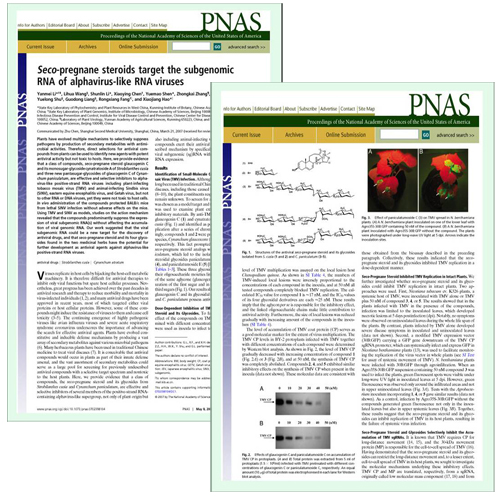Plants have evolved multiple mechanisms to selectively suppress pathogens by production of secondary metabolites. Therefore, direct selections for antiviral compounds from plants can be used to identify new agents with potent antiviral activity but not toxic to hosts. In collaboration with CAS Institute of Microbiology, Institute for Viral Disease Control and Prevention, Chinese Center for Disease Control and Prevention (China CDC) and Institute of Biotechnology, Yunnan Academy of Agricultural Sciences (YAAS), the research group led by Prof. Hao Xiaojiang, for the first time, found that a class of compounds, seco-pregnane steroid glaucogenin C and its monosugar-glycosides are effective and selective inhibitors to alphavirus-like positive-strand RNA viruses including plant-infecting tobacco mosaic virus (TMV) and animal-infecting Sindbis virus (SINV), eastern equine encephalitis virus (EEEV), and Getah virus (GETV), but not to other RNA or DNA viruses, yet they were not toxic to host cells. In vivo administration of the compounds protected BALB/c mice from lethal SINV infection without adverse effects on mice. Using TMV and SINV as models, studies on the action mechanism revealed that the compounds predominantly suppress the expression of viral subgenomic RNA(s) without affecting the accumulation of viral genomic RNA. Their work suggested that the viral subgenomic RNA could be a new target for the discovery of antiviral drugs, and that seco-pregnane steroid and its glycosides found in the two kinds of medicinal herbs have the potential for further development as antiviral agents against alphavirus-like positive-strand RNA viruses. This study was published in the journal of PNAS (PNAS, 2007, 104(19): 8083-8088).





